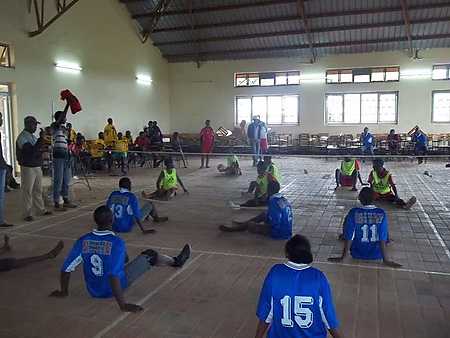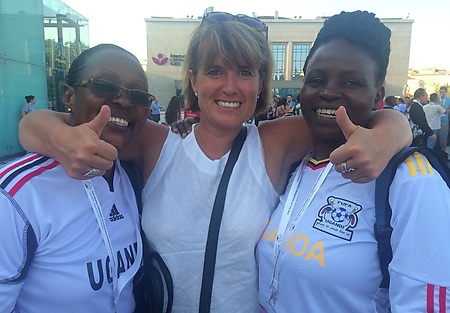Deaf Life23rd November 2015
Commitment and Tenacity Supporting Uganda National Association of the Deaf
Florence Nightingale Mukasa puts heart and soul into working for Deaf people in Uganda
 Florence Nightingale Mukasa has just enjoyed her 54th Birthday. As her name suggests, she is a special woman, with a giving and generous heart. Born in the Mbarara District in Western Uganda, Florence was born hearing, but became Deaf at the age of 7 due to meningitis. Cared for by her grandmother when her parents split up, she was brought up as the only Deaf child in a hearing family, with her grandmother doing a good job in teaching her how to speak the local language.
Florence Nightingale Mukasa has just enjoyed her 54th Birthday. As her name suggests, she is a special woman, with a giving and generous heart. Born in the Mbarara District in Western Uganda, Florence was born hearing, but became Deaf at the age of 7 due to meningitis. Cared for by her grandmother when her parents split up, she was brought up as the only Deaf child in a hearing family, with her grandmother doing a good job in teaching her how to speak the local language.
Attending mainstream primary schools at Nombe and Mengo, Florence had no access to sign language in those early years of her life, however, that changed when she transferred to the Uganda School for the Deaf. To finish her education and to gain higher level qualifications, Florence had to return to mainstream schools. “It was a huge challenge in the hearing schools,” Florence told me, “being teased by fellow pupils at school. I would sit in front of the class to enable me to lip-read teachers. I would copy what other students were writing and my colleagues and the teacher were very helpful because they knew my problem.”
“Life became easy when I joined the School for the Deaf. At first I thought I was the only Deaf child in the whole world, but when I saw my fellow Deaf students it gave me hope as well as developing my interest in learning Sign Language.”
Faced with similar communication barriers experienced by lots of Deaf children worldwide, a painful memory for Florence is that her parents separated, blaming each other for, “bringing this curse of deafness into the family.” In the mainstream schools, Florence recalled how the children there would tease her and call her names related to her being Deaf. “Up until this day, where I live, people call and know me by my disability not by my name,” Florence tells me with some sadness.
 Like most children, Florence grew up with ambitions, and for her, she saw her future as an airhostess or a nurse. Sadly, because of her deafness, those jobs were seen as out reach for her, so she ended up leaving school to become a Secretary with the Uganda Electricity Board. However, in 1993 she joined the Uganda National Association of the Deaf ( UNAD ) as the National Sign Language Coordinator, and whilst she has gone on to fulfil several different roles, she still works there.
Like most children, Florence grew up with ambitions, and for her, she saw her future as an airhostess or a nurse. Sadly, because of her deafness, those jobs were seen as out reach for her, so she ended up leaving school to become a Secretary with the Uganda Electricity Board. However, in 1993 she joined the Uganda National Association of the Deaf ( UNAD ) as the National Sign Language Coordinator, and whilst she has gone on to fulfil several different roles, she still works there.
“UNAD was first set up in 1973,” Florence explained. “It is a not-for-profit umbrella organisation, bringing together all the different categories of Deaf people including those with multiple disabilities. UNAD’s vision is to have a Uganda where Deaf people live in dignity.” The important work of UNAD is underpinned by their mission to:
- Advocate for the human rights of deaf persons;
- Gain access to quality services; and
- Build the capacity of the District Associations of the Deaf.
 UNAD focuses on the empowerment of Deaf people through Sign Language training, capacity building, advocacy and implementing specific programs to meet the identified needs of its Deaf members, including socio-economic issues.
UNAD focuses on the empowerment of Deaf people through Sign Language training, capacity building, advocacy and implementing specific programs to meet the identified needs of its Deaf members, including socio-economic issues.
“UNAD is an ordinary member of the World Federation of the Deaf (WFD), National Union of Disabled Persons of Uganda (NUDIPU), Uganda National NGO Forum and many other Civil Society Organisations,” Florence told me. “It is also recognised by the Government of Uganda and is consulted upon regularly both by Government and other organisations on matters pertaining to Deafness and Disability issues.”
 Florence changed roles within UNAD in 2001 to become the organisation’s Gender Officer, before moving on to be the National Gender and Theatre Coordinator in 2004, and then the Gender and Vulnerable Group Coordinator in 2010. Within her role, she travelled to the United Kingdom to attend a Sign Language Research Workshop at Bristol University.
Florence changed roles within UNAD in 2001 to become the organisation’s Gender Officer, before moving on to be the National Gender and Theatre Coordinator in 2004, and then the Gender and Vulnerable Group Coordinator in 2010. Within her role, she travelled to the United Kingdom to attend a Sign Language Research Workshop at Bristol University.
Interestingly, Florence is one of the first Deaf people to write the Uganda Manual in Sign Language (USL). She holds Diplomas and has built up a lot of experience in both local and international issues in the fight for the rights of women and children with disabilities and specifically Deaf children.
Now 40 years old, UNAD is governed by a Board of Directors who act as a decision making body. Directors are elected by the General Assembly every five years, that General Assembly made up of a delegation from seven Regional Deaf Associations that have representatives from each of the District Associations of the Deaf.
 On a day to day basis, the organisation is managed by a 26 strong team, including the Executive Director and six volunteers. However, unlike the majority of the UK based Deaf charities, 90% of the staff are Deaf and communication is usually undertaken using sign language.
On a day to day basis, the organisation is managed by a 26 strong team, including the Executive Director and six volunteers. However, unlike the majority of the UK based Deaf charities, 90% of the staff are Deaf and communication is usually undertaken using sign language.
Since it first started, the Uganda National Association of the Deaf has been instrumental in driving change including:
- Sign Language was recognised in the constitution of Uganda as one of the languages in the country.
- Deaf people in the country are free to use Sign Language in different spheres of life e.g. education, Health, Courts of Law etc.
- A Sign Language Interpretation Diploma Course has been introduced in one public university in the country ( Kyambogo University ).
- The negative attitudes towards Deaf people are slowly changing.
- Establishment of a Resource Training Centre which is training Deaf people in 5 disciplines of Carpentry and Joinery, Tailoring, Knitting, ICT and Filming.
- A member in the parliament of Uganda who is Deaf, represents people with disabilities
- Enhanced partnerships and collaborations with several like-minded organisations who have supported or sponsored various activities

However, as with the drive for Deaf equality and the eradication of Deafism in other parts of the world, achievements have not come easily and difficulties still remain. One of UNAD’s biggest challenges is the over dependency on donors, meaning that if they pulled out today, activities would come to a standstill. Other challenges include the negative attitudes towards Deaf people that persist among different service providers. Sadly, 90% of Deaf children in Uganda are not going to school and the educational failure rate of those that do, is high.
Access to information is problematic as many Deaf people are unable to read. This means they are excluded from the information on television as there are no Sign Language Interpreters. People in society have little knowledge or understanding of sign language and Deaf people find it difficult to get jobs because of their poor educational standards.
“Due to communication barriers, cultural beliefs and discrimination, most of the Deaf members of the Uganda society are denied access to vital information, thus their sexual and reproductive health rights are abused,” Florence explained. “Access to information on diseases like HIV and AIDs, Cancer and many more, remains a big challenge.”
Ultimately, UNAD are hoping to secure a life of dignity for all Deaf people in Uganda. They advocate for the respect of their Human Rights, the promotion of sign language and access to quality services like education and health. They also hope to build the capacity of the District Deaf Associations.

Now a Board Member of the National Union of Disabled Persons of Uganda, Florence believes that success would be marked by Deaf people being able to communicate in Sign Language when accessing services. In pursuit of this goal, she intends to intensify the fundraising of the organisation so that she and other people within UNAD can continue with their important work.

Knowing the giving and helpful nature of Deaf people from around the world, I asked Florence what people can do to help. “People can contribute moral, technical and financial support to the well-being of all Deaf people in Uganda,” an impassioned Florence responded.
Understanding the longevity of similar fights here in the UK and other countries around the world, I can but hope that Florence and the team at UNAD get the support they need in pursuit of their much needed improvements.
Article by Sarah Lawrence, Editor
posted in Community / Deaf Life
23rd November 2015





